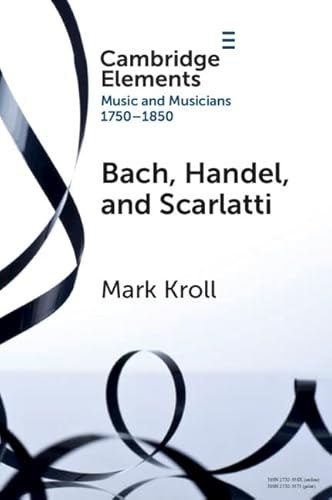Bach, Handel and Scarlatti
Reception in Britain 1750-1850 (Elements in Music and Musicians 1750-1850)
Mark Kroll
BOOK REVIEW

The world of classical music is not merely a backdrop for the grand orchestras and illustrious performances we admire; it's a treacherous battleground of ideologies, cultures, and artistic values. Bach, Handel and Scarlatti: Reception in Britain 1750-1850 by Mark Kroll dives deep into this turbulent arena, unearthing how three monumental figures of music reshaped British sensibilities during a pivotal era in history. ✨️
This book isn't just an academic endeavor; it's a visceral exploration of how the music we revere today was litigated, debated, and ultimately embraced-or rejected-by the public consciousness of a nation. Kroll expertly crafts a narrative that surrounds the reception of Johann Sebastian Bach, George Frideric Handel, and Domenico Scarlatti, revealing the intricate tapestry of British cultural life in the 18th and early 19th centuries. 🎼
Picture a world where the very fabric of musical appreciation is unspooled. Kroll does not merely recount events; he slathers them in intrigue and emotion. He forces us to confront the beguiling question: how did these titans manage to weave their genius into the British musical landscape? What were the obstacles, the prejudices, and the triumphs that shaped their reception?
Engaging with Kroll's work is akin to stepping into a time machine, whirling back to the salons and concert halls where the echoes of Bach's fugues, Handel's oratorios, and Scarlatti's sonatas lingered. This was an epoch ripe with contention; Handel, once shunned for his opera compositions, went on to become a cultural hero through his oratorios, while Bach, initially met with skepticism, eventually blossomed into the emblem of German baroque music. Scarlatti's spirited keyboard works brought a dash of daring and innovation that captivated audiences, transcending national boundaries, and injecting fervor into the British musical scene.
Yet, readers are treated to more than just biographical sketches; they encounter a melting pot of reactions ranging from adulation to disdain. Comments from contemporaneous critics permeate the text, revealing a cacophony of opinions. Handel, despite his monumental contributions, faced vitriol from those who deemed his style too commercial. Bach, often confined to the shadows of history, is portrayed through Kroll's lens as a figure whose time would eventually come, highlighted by passionate advocates who recognized his brilliance even when the mainstream overlooked it.
Moreover, Kroll's work provides an incisive critique of how socio-political changes woven into the fabric of British society dictated the ebb and flow of these composers' legacies. This period was steeped in political turmoil, revolutions, and shifting musical tastes, causing the reception of these composers to be as much about music as it was about identity and cultural pride. Transformations in class dynamics and emerging nationalisms gave rise to a musical awakening that made the British embrace the likes of Handel and Bach, while Scarlatti emerged serendipitously as a heart-throbbing nod to the allure of Italian musical style.
Critics have polarized opinions on Kroll's conclusions, debating whether he overemphasizes the role of public reception in establishing musical canon or whether his analysis resonates as a timely reminder of music's power to unite and divide. Readers express awe at Kroll's probing approach, yet some challenge his perspectives on the implications of national identity during this period-questions that echo today as we confront contemporary issues of cultural appropriation and musical globalization.
As you delve into Bach, Handel and Scarlatti: Reception in Britain 1750-1850, you're not just exploring music history; you're navigating the complex interplay between art and society that still resonates fervently in our modern age. Will you join this tumultuous journey through the corridors of time and melody? The ante has been upped, and the stakes are immense. This is history waiting to be unearthed, a narrative crying out to engulf you in its compelling embrace. 🌍🎶
📖 Bach, Handel and Scarlatti: Reception in Britain 1750-1850 (Elements in Music and Musicians 1750-1850)
✍ by Mark Kroll
🧾 88 pages
2022
#bach #handel #scarlatti #reception #britain #17501850 #elements #music #musicians #1750 #1850 #mark #kroll #MarkKroll